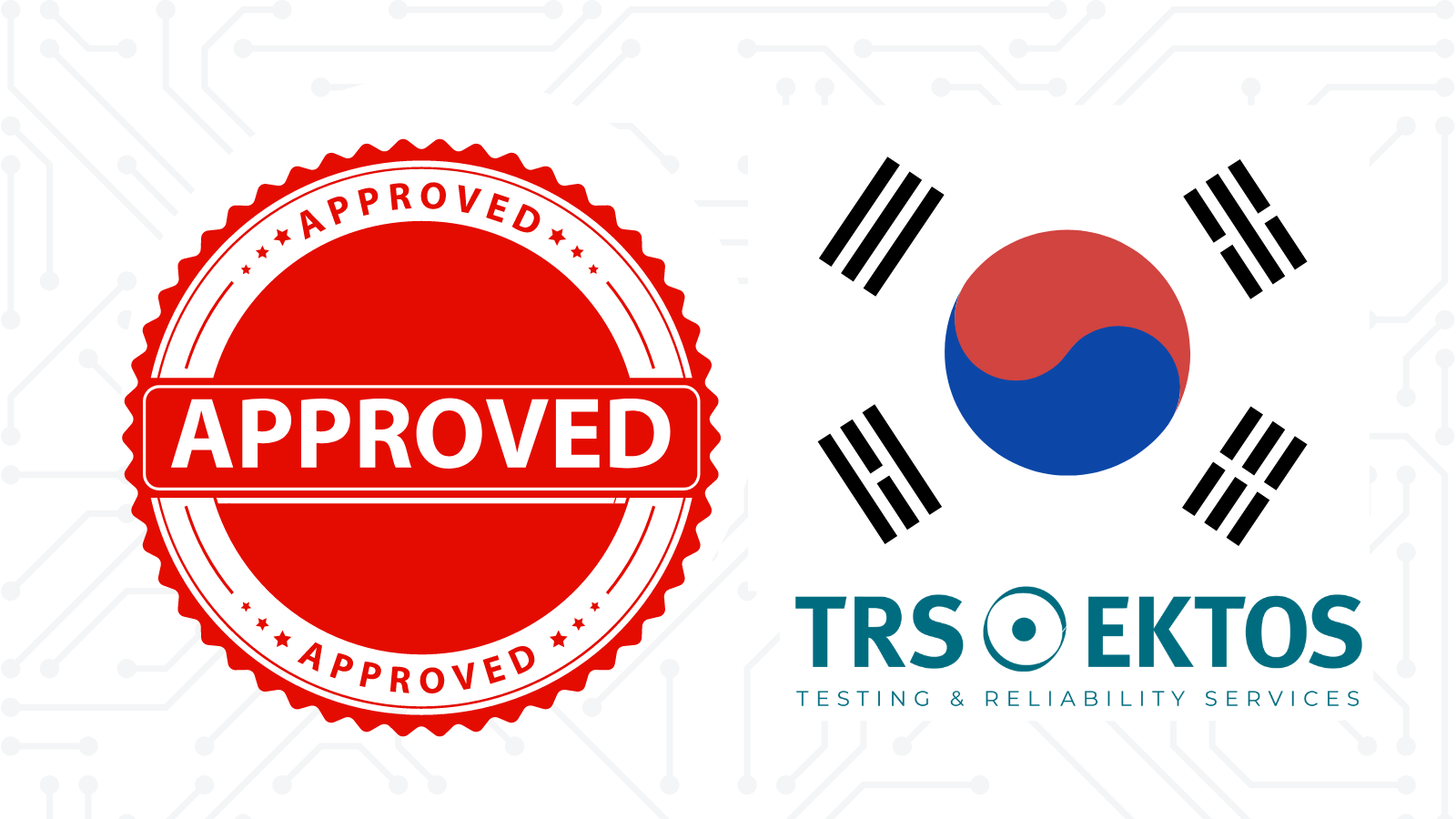EKTOS TRS Now Authorized to Test Products for South Korean Market Entry!

European electronics manufacturers may face delays or rejections when entering the South Korean market. This is due to the requirement that products undergo testing in approved labs before market entry. These labs must adhere to strict protocols and standards set by regulatory agencies to ensure accurate and reliable results. Manufacturers must provide detailed documentation of the testing process and results to demonstrate compliance with South Korean regulations. Failure to meet these requirements results in market access denial.
Thanks to the EU-South Korea Free Trade Agreement (FTA) that was formally ratified in December 2015 EU exporters are able to enjoy reduced financial burdens when entering the market. The agreement permits EU exporters to conduct Electromagnetic Compatibility (EMC) testing of their products in EU laboratories, leading to cost reduction and ensuring compliance with Korean requirements. While South Korea maintains the option for third-party certification in specific cases, the FTA grants EU exporters
increased flexibility and cost savings for meeting regulatory standards. The regime that eases certification procedures for electrical and electronic products is set out here in Annex 2B on Electronics.
EKTOS Testing and Reliability Services (TRS) has recently been added to the roster of competent European labs for testing electronics bound for South Korea. Approval from the European Union (EU) solidifies TRS’ position as a trusted testing lab, facilitating entry for EU-based manufacturers into the lucrative South Korean market. With TRS’ stamp of approval, manufacturers can navigate regulatory hurdles confidently, ensuring seamless market access.
EKTOS TRS’ two well-equipped labs in Denmark ensure precise and reliable testing results. From product safety assessments to environmental, HALT, and performance evaluations, TRS serves manufacturers from diverse industries. With TRS’ accreditation, manufacturers can streamline their testing processes, reducing time-to-market and associated costs.
EKTOS TRS nu autoriseret til at teste produkter og give adgang til det sydkoreanske marked!
Europæiske elektronikproducenter kan opleve forsinkelser eller afvisninger, når de forsøger at trænge ind på det sydkoreanske marked. Dette skyldes kravet om, at produkter skal gennemgå test i godkendte laboratorier for at få markedsadgang. Disse laboratorier skal overholde strenge protokoller og standarder fastsat af regulerende myndigheder for at sikre nøjagtige og pålidelige resultater. Producenterne skal fremlægge detaljeret dokumentation for testprocessen og resultaterne for at påvise overholdelse af sydkoreanske regler. Manglende overholdelse af disse krav resulterer i afvisning af markedsadgang.
Takket være EU-Sydkorea frihandelsaftalen (FTA), der blev formelt ratificeret i december 2015, kan EU-eksportører nyde godt af reducerede økonomiske byrder ved træde ind på markedet. Aftalen tillader EU-eksportører at udføre
elektromagnetisk kompatibilitetstest (EMC) af deres produkter i EU-laboratorier, hvilket giver omkostningsreduktioner og sikrer overholdelse af koreanske krav. Selvom Sydkorea opretholder muligheden for tredjepartscertificering i specifikke tilfælde, giver FTA EU-eksportører større fleksibilitet og omkostningsbesparelser for at opfylde reguleringsstandarderne. Regelsættet, der letter certificeringsprocedurer for elektriske og elektroniske produkter, er beskrevet her i bilag 2B om elektronik.
EKTOS Testing and Reliability Services (TRS) er for nylig blevet tilføjet til listen over kompetente europæiske laboratorier til testning af elektronik bestemt for Sydkorea. Godkendelse fra Den Europæiske Union (EU) bekræfter TRS’ position som et betroet testlaboratorium, hvilket letter indgangen for EU-baserede producenter på det lukrative sydkoreanske marked. Med TRS’ godkendelsesstempel kan producenterne med større sikkerhed navigere i reguleringshindringer og sikre mere gnidningsfri markedsadgang.
EKTOS TRS’ to veludstyrede laboratorier i Danmark sikrer præcise og pålidelige testresultater. Lige fra produktsikkerhedsvurderinger til miljømæssige, HALT- og præstationsevalueringer betjener TRS producenter fra mange forskellige industrier. Med TRS’ akkreditering kan producenterne strømline deres testprocesser, reducere tid til markedet og tilhørende omkostninger.